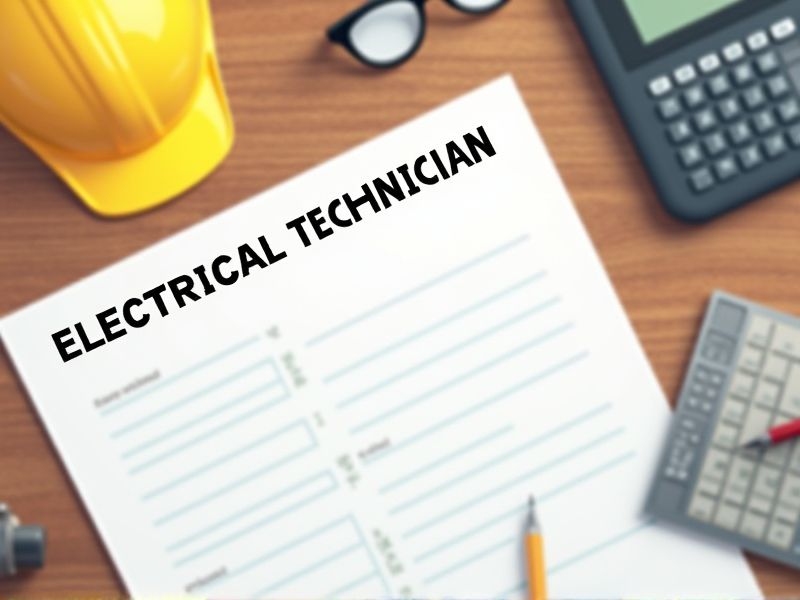
Electrical technicians require certain certifications to ensure they possess the essential skills and safety knowledge necessary for the job. Certifications validate a technician's ability to work with electrical systems in compliance with industry standards and regulations. This formal recognition can enhance employment opportunities and professional credibility. Here are some essential certifications you might need as an electrical technician.
OSHA 10-Hour General Industry Certification
OSHA 10-Hour General Industry Certification provides foundational safety knowledge crucial for electrical technicians, minimizing the risk of workplace accidents. Training imparts awareness of hazard communication standards, a legal requirement for handling electrical materials safely. Electricians benefit from understanding personal protective equipment use, reducing exposure to electrical hazards. Certification enhances employer compliance with OSHA regulations, potentially diminishing liability and improving workplace safety culture.
OSHA 30-Hour General Industry Certification
The OSHA 30-Hour General Industry Certification provides electrical technicians with critical knowledge of workplace safety standards, which significantly reduces the likelihood of accidents and injuries. By understanding OSHA regulations, technicians are better equipped to recognize and mitigate potential hazards in the electrical environment. This certification enhances an electrician's credibility and employability, as many employers prioritize candidates with verified safety training. The comprehensive safety education helps ensure a safer work environment, promoting compliance with legal safety requirements.
NICET Level I Electrical Certification
NICET Level I Electrical Certification demonstrates a foundational understanding of electrical engineering principles, which is critical for ensuring safety and compliance in projects. Employers often require this certification to verify that technicians have been formally evaluated and meet industry standards. Certified technicians can more effectively troubleshoot and resolve electrical issues, thereby reducing downtime and increasing operational efficiency. Holding a NICET certification can lead to increased job opportunities and advancement potential within the electrical field.
National Electrical Code (NEC) Certification
The National Electrical Code (NEC) Certification ensures electrical technicians understand and adhere to the safety standards necessary for preventing electrical hazards. By obtaining this certification, technicians demonstrate their proficiency in installing and maintaining electrical systems in compliance with nationally recognized protocols. The NEC Certification is often a requirement for employment, as it assures employers of the technician's competence and reliability. This certification can enhance career opportunities and credibility within the industry by validating technical knowledge and skills.
Electrical Safety Training (NFPA 70E) Certification
Electrical Safety Training, particularly NFPA 70E Certification, is necessary for electrical technicians to reduce the risk of workplace injuries from electrical hazards. The certification standardizes safety practices, ensuring technicians are well-versed in identifying and mitigating potential electrical risks. It enhances compliance with OSHA regulations, minimizing legal and financial repercussions for employers. It fosters a safety-first culture, ultimately decreasing the number of workplace accidents and improving overall team productivity.
Lockout/Tagout (LOTO) Certification
Lockout/Tagout (LOTO) certification ensures that electrical technicians can safely disconnect and secure power sources, preventing accidental energization during maintenance. This certification reduces the risk of electrical shock and related injuries, contributing to workplace safety. Compliance with OSHA standards, which mandate LOTO procedures, helps organizations avoid legal and financial penalties. LOTO certification increases technicians' confidence, enhancing efficiency and reducing downtime during equipment servicing.
Arc Flash Awareness Certification
Arc Flash Awareness Certification is essential for electrical technicians because it enhances their understanding of the potential hazards, greatly reducing the risk of serious workplace injuries. Knowledge gained through certification helps technicians implement appropriate safety practices that comply with industry standards. This certification ensures that electrical systems are handled with precision, preventing costly damage to equipment and infrastructure. Employers gain assurance that certified technicians maintain a safe work environment, which can lead to reduced liability and insurance costs.
Programmable Logic Controller (PLC) Certification
PLC Certification equips electrical technicians with specialized skills to program and troubleshoot automated systems, enhancing their job performance. The demand for automated solutions in industries is growing, and certified technicians are preferred for their expertise in maintaining efficient operations. Certification often translates to increased job opportunities and higher earning potential, as employers seek qualified individuals. Gaining PLC Certification can result in improved safety practices, as technicians are trained to adhere to industry standards and protocols.
First Aid/CPR Certification
Electrical technicians frequently work with high-voltage systems, increasing the risk of electric shock incidents. First Aid/CPR certification equips them with crucial skills to respond effectively in emergencies, potentially saving lives. Immediate response is crucial to minimize injury severity or fatality, underscoring the importance of such training. Employers often require certification to ensure workplace safety compliance and regulatory adherence.
Industrial Electrical Troubleshooting Certification
Industrial Electrical Troubleshooting Certification equips electrical technicians with advanced skills to diagnose and fix complex electrical issues, reducing downtime and boosting productivity. As industries increasingly rely on automated systems and sophisticated machinery, certified technicians ensure safe and efficient operations, minimizing risks of costly errors. Certification signals to employers that the technician meets industry standards, enhancing employability and career advancement opportunities. It also fosters confidence in clients and employers, knowing that certified professionals adhere to best practices and safety protocols.
Summary
As an electrical technician, obtaining certifications can significantly enhance your career prospects and credibility. Certified technicians often experience increased job opportunities and may access higher-paying positions. Employers tend to favor certified candidates for their validated skills and knowledge, reflecting professional readiness. Certification can lead to greater job security and professional growth within the field.
